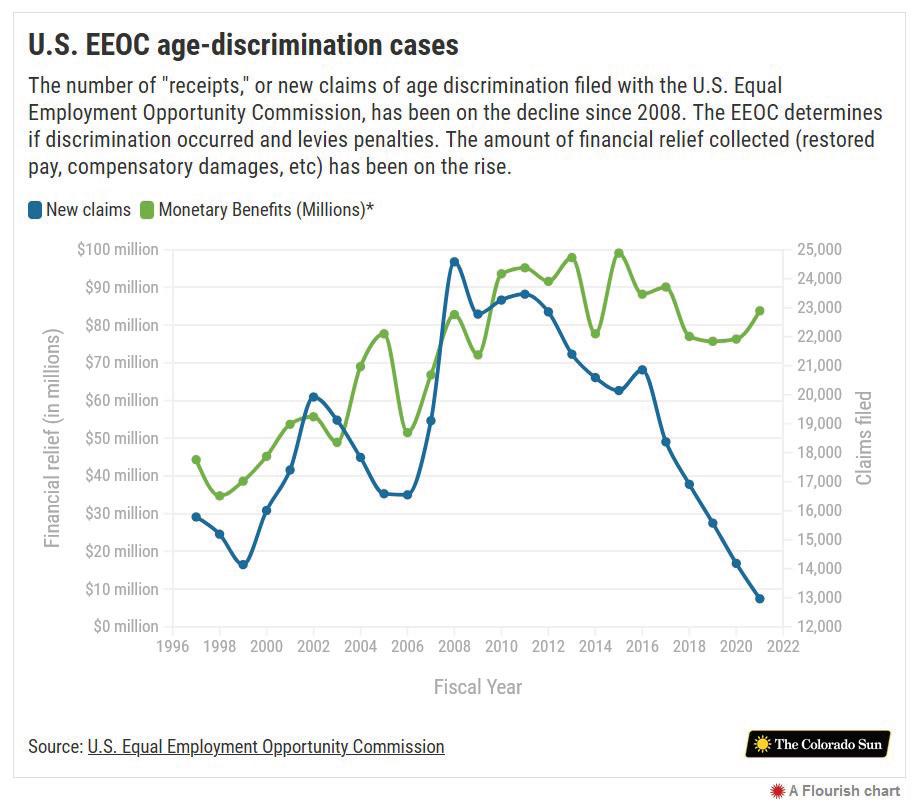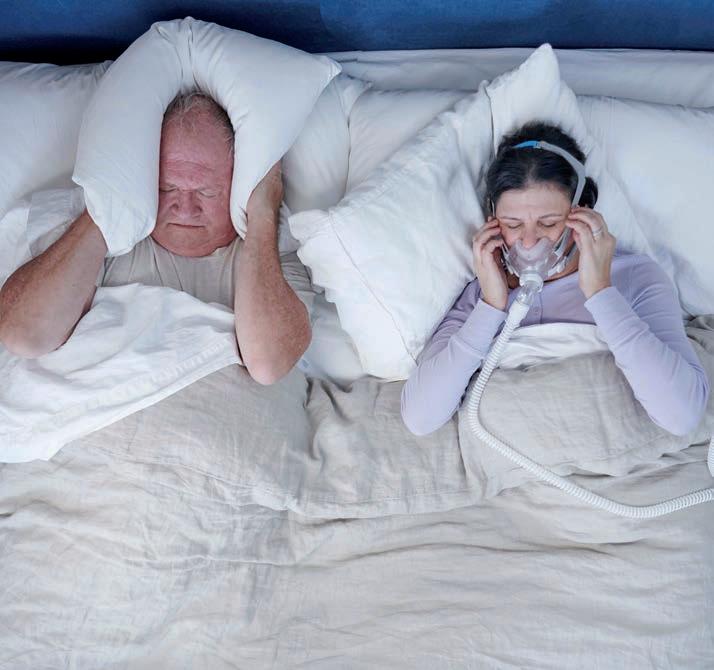
4 minute read
Colorado may end age-discriminating work question
How old are you?
BY TAMARA CHUANG THE COLORADO SUN
Asking someone their age is considered impolite. But asking a job candidate? at’s perfectly legal.
A bill at the state legislature would change that, at least in Colorado, and prohibit companies from shing around for an age by asking about high school or college graduation dates. Older job candidates never know if that little number got in the way of a callback so this proposal would eliminate that doubt.
“In order to combat that kind of age discrimination in the hiring process, we mean to eliminate any ageidentifying items in the job application process,” said state Sen. Jessie Danielson, a Democrat from Wheat Ridge who is the prime sponsor of the bill. “ at way, older Coloradans are being judged on their merit equal to their younger counterparts when they’re trying to get a new job.” ere are exceptions, including occupations with age limits — commercial pilots, for example, must be under 65, per federal law. e bill joins others introduced in recent years attempting to address workplace equity for Coloradans of all genders, backgrounds and abilities. It also comes at a time when the state really needs more workers and adults nearing retirement age or beyond it are seen as an underutilized workforce.
Senate Bill 58, also known as the Job Application Fairness Act, is straightforward: remove any part of a job application asking about age.
In a job survey conducted by AARP last year, 53% of respondents who were recent job seekers said they were asked by an employer to provide their birth date during the application or interview process, while 47% were asked for a graduation date.

“Of course you can guesstimate how old someone is if they graduated in 1987 from high school,” said Bill Rivera, senior vice president of AARP Foundation Litigation. “It’s unfortunate that age discrimination still seems so alive and well. And frankly, I think people don’t get that upset about it.”
He pointed to electronic hiring systems that ask for dates — and don’t let the applicant move forward if the question is not answered. “And think about the people who are dissuaded from applying in the rst place,” he said.
Sometimes, the companies don’t even ask. Amazon, T-Mobile and other tech companies were accused in 2017 of using Facebook’s targeting tools to target 18 to 38 year olds for job openings and thereby excluded older Americans, according to the lawsuit by Communications Workers of America. e companies ended up settling and Facebook paid $5 million and agreed to block discriminatory ads.
“Ageism often is still one of the last acceptable bastions of isms,” Rivera said. “And so in the workplace, you will get a greater tolerance for jokes about aging, when you are going to retire or people having ‘senior’ moments or other things that you wouldn’t tolerate … if you were making racial, ethnic or misogynist jokes.”
Age discrimination enforcement is reactive ere is no telling how much age discrimination at work goes on in America. A lot is anecdotal. But there is a federal law protecting workers 40 and older. It’s the Age Discrimination in Employment Act of 1967. ADEA doesn’t prohibit asking job seekers their age.
Some of the cases made public were eye-popping. An HR director at Swiss manufacturer Fischer Connectors in Atlanta witnessed the company “repeatedly turning down quali ed older employees in favor of less quali ed, younger employees.” She was red when she questioned the actions and refused to participate and was replaced by two younger workers, according to the EEOC. e EEOC investigated after hearing from a female applicant over 55. She was rejected. But a day later, she submitted the same application with a “more recent date of birth” and was o ered an interview, the lawsuit said.
Last May, the EEOC sued iTutorGroup, an service providing online English-language tutoring to students in China, alleging that the company programmed its recruitment software to automatically reject female applicants 55 or older and male applicants 60 and over. More than 200 quali ed applicants were rejected because of their age, according to the EEOC.
Justin Plaskov, a Denver attorney at Colorado Employee Advocates who represents workers in discrimination cases, said the employment discrimination data is underreported because not everyone reports it.
“ ere’s a lot of discrimination happening but the burden to prove a discrimination case is incredibly high,” Plaskov said. “I see cases all the time where it seems like there’s discrimination happening. But because of a lack of economic damages, or a lack of corroborating evidence, it’s not a case we’d be able to take on. But yeah, I absolutely think it’s still incredibly prevalent in our workplaces.”
Plaskov, who helped the EEOC successfully win a $20.5 million award against Jackson National Life Insurance Company for discriminating against 21 workers in 2020, said he turns away more than 90% of the inquiries he receives. But he theorized that the EEOC numbers may be low and declining because states are more active. He said the Colorado Civil Rights Division is faster at investigating cases and much more robust.
According to the latest CCRD annual report, the agency, which is responsible for enforcing the state’s anti-discrimination laws for employment and housing, 11% of the 1,090 employment-related complaints led in scal year 2021 were about age. Disability and discrimination based on sex were much higher, at 23% and 21% respectively.
But ultimately, it’s up to the person who faced discrimination to report it and that’s why it’s hard to know exactly how prevalent age discrimination actually is.

“Both the state and federal government rely on individuals ling charges to alert them,” Plaskov said. “ at’s the system we have set up.”
Colorado needs more workers
One of the highlights of Colorado’s recovery from the COVID-19 pandemic is that people have returned to work or the job hunt at higher rates than other states. Colorado has ranked among the top states nationwide for highest rates of labor force participation. In other words, 69% of Coloradans over 16 work or are looking for work, as of December. Other states have larger adult populations that are retired or on disability and aren’t looking for a job.
But Colorado’s population is getting older. And if people in their 50s, 60s, 70s and older give up on nding work and retire, that will eat into the state’s productivity and cause a cascading economic e ect, said Elizabeth









